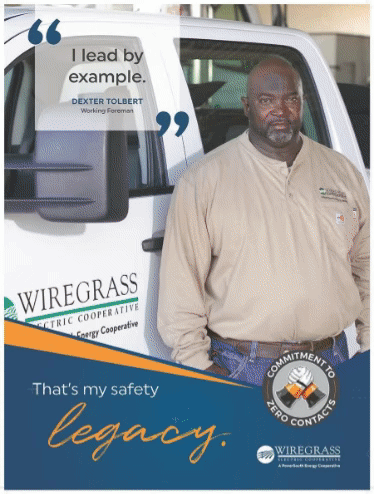At
Wiregrass Electric Cooperative in Alabama, the safety posters hanging in the lineworker meeting room are hard for crews to ignore.
Every day, as they head out on the job from the co-op’s Hartford headquarters, they pass posters (see examples below right) of themselves, their co-workers and even their families reminding them to wear their protective gear, stay focused and lead by example.
[section separator="true"]
[section-item 6]
[row]
[column 10]
“If you look up and see a poster of your family, it gives you a little something extra to think about before you leave that morning,” says Johnny Hudson, a construction crew foreman who posed for a poster with his wife and two small sons. “It helps you remember why safety is so important.”
[/column]
[/row]
[/section-item]
[section-item 6]
[row]
[column 12]

[/column]
[/row]
[/section-item]
[/section]
The posters and a new video are part of the 26,000-meter co-op’s Safety Legacy Campaign, which incorporates NRECA’s
Commitment to Zero Contacts initiative to reduce serious injuries and deaths caused by accidental contact with electricity.
Brad Kimbro, the co-op’s chief operating officer, says the “safety legacy” idea started when he and other WEC staff and directors attended a statewide association meeting in 2021. During that event, a safety trainer shared the story of someone who had been killed by an electrical contact.
“He kept using the word ‘legacy,’” Kimbro recalls. “We incorporated that into our safety program and our new safety campaign. What’s going to be your safety legacy? Not just when you retire, but what are you doing out there right now that’s creating a legacy for the future? If this helps our employees decide not to take a shortcut when it comes to safety, it can make a difference in them not losing a limb or their life.”
Like all co-ops, WEC makes safety for lineworkers a priority. “But it became clear to me that we needed to help them understand the why,” Kimbro says. “Why do we sit here and go through all these hours of training? Why do I want to be safe? If not for yourself, then it might be for your fellow linemen, your wife, your children.”
He notes that experienced lineworkers are often more likely to be involved in accidents.
“Their attitude can be, ‘I’ve done it this way 100 times, I can take this shortcut again,’” Kimbro says. “So, we ask them, ‘What’s your legacy going to be? What’s this younger guy watching you going to do?’”
The Safety Legacy Campaign is just the latest effort by the co-op to engage its employees. The biggest change came several years ago when WEC created an employee safety committee, replacing the old top-down approach of having a lone safety director make all the rules.
[blockquote quote="%E2%80%9CWe%20let%20them%20know%20we%20love%20them%20and%20that%20we%20don%E2%80%99t%20want%20to%20have%20to%20make%20that%20call%20to%20their%20family%20saying%20something%20has%20happened.%20We%20need%20to%20look%20after%20each%20other.%E2%80%9D" author="Brad%20Kimbro%2C%20Wiregrass%20EC%20chief%20operating%20officer" /]
The committee has about a dozen members—roughly half of them lineworkers—and includes Kimbro and CEO Les Moreland. The lineworkers vote to elect their colleagues to serve three-year terms on the panel, which meets monthly. All committee members attend NRECA’s Safety Leadership Summit.
“I think everybody bought into the safety program because they have a say when an issue comes up,” says Hudson, who serves on the committee. “It used to be when a safety rule came down, it was like, ‘Hey, this is going to be what we’re doing from now on.’ They may not even have given you an explanation. Now, everybody knows that their voice was heard. You know the reason the rule is changing. It just makes things go a lot smoother.”
It’s important for co-op management to show lineworkers their safety is valued, Kimbro says.
“Don’t nickel and dime them,” he says. “If they want an extra pair of boots that are waterproof and the contract says they only get one, don’t sweat that extra $50 or $75 expense. If you balk at that, it undermines everything you’ve said about your commitment to their safety.”
Management also tells lineworkers not to rush beyond what’s safe when it comes to restoring power after a storm or other event.
“We’re not on an assembly line—it’s safety before speed,” Kimbro says. “Let us worry about the mad folks if there are any.”
Ultimately, Kimbro says, building a safety legacy is really all about building trust.
“We let them know we love them and that we don’t want to have to make that call to their family saying something has happened,” he says. “We need to look after each other.”
